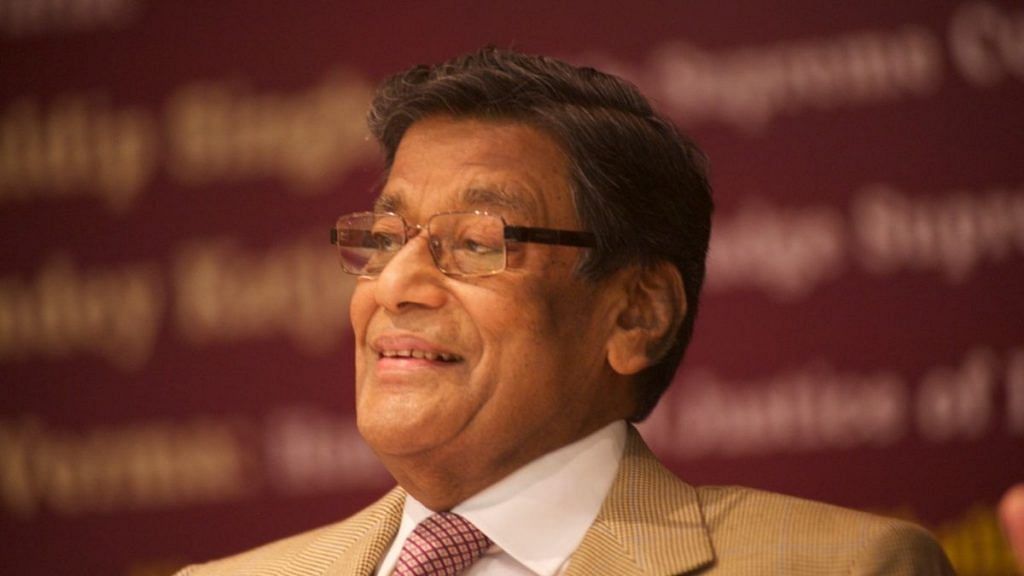New Delhi: Greater representation of women at all levels of judiciary, including the Supreme Court, could help bring a balanced and empathetic approach in cases involving sexual violence, the attorney general told the top court Tuesday.
The country’s top law officer, K.K. Venugopal, made this suggestion as part of written submissions to the court, which had sought his assistance in a petition questioning the bail conditions imposed by the Madhya Pradesh High Court in a case of molestation this August.
The high court had granted bail to the accused on the condition that he would get a rakhi tied by the victim. The accused was asked to go with his wife to the complainant’s house with a box of sweets to get the rakhi tied.
Advocate Aparna Bhat and six women lawyers subsequently moved a petition before the top court to expunge the high court direction, taking exception to the “non-empathetic” approach of the judge.
They said such judgments from high courts would end up trivialising such heinous offences and “there is a strong likelihood that such observations and directions may result in normalising what is essentially a crime and has been recognized to be so by the law”.
In his submission, which has been accessed by ThePrint, Venugopal asked the top court to lay down guidelines to make sure bail conditions are free from “stereotypical or parental notions of women and their place in society”. Courts, he added, must not encourage a compromise between complainant and the accused.
“Improving the representation of women in the judiciary could also go a long way towards a more balanced and empathetic approach in cases involving sexual violence. For instance, this court (SC) only has two women judges, as against a sanctioned strength of 34 judges. There has never been a female Chief Justice of India,“ the AG said.
He also called for gender sensitisation of both the bar and the bench, particularly with regard to creating a sense of judicial empathy towards victims.
A bench led by Justice A.M. Khanwilkar heard arguments in the case Wednesday and reserved it judgment on the petition.
Also read: Not unusual to make daughter-in-law do house work, says Kerala HC in a divorce case
‘No compulsory gender course in law schools’
At the last hearing in the matter, the Supreme Court bench had noted that the high court direction had been complied with, but agreed to keep the petition pending for framing guidelines to avoid a repeat of such orders. For this, it had requested Venugopal to make some suggestions.
According to the AG, the court must first initiate an exercise to improve the strength of women in the judiciary. He said the court must direct collection of data to determine how many women judges are at present serving in courts, how many are appointed in tribunals, and how many women lawyers have been designated as senior advocates.
Venugopal added that there is no course on gender that is compulsorily taught in law schools, and that some law schools have the subject either as a specialisation or as an elective.
“Equally, the All India Bar Examination does not contain even a single question or section relating to gender sensitisation. The Bar Council of India may take necessary steps in this regard,” the AG said.
Also read: Unbecoming of Indian women to sleep after rape — HC notes while giving anticipatory bail
‘No compromise’
Guidelines on bail and anticipatory bail should be in line with already settled jurisprudential principles to ensure courts only impose conditions that are permissible and in accordance with statutes, Venugopal suggested.
He has recommended that bail conditions should not mandate contact between the accused and the victim, and must seek to protect the complainant from any harassment by the accused.
Where necessary, the court may hear the complainant on whether there is any peculiar circumstance that may require additional conditions for her protection. Once the accused is granted bail, the complainant may immediately be informed about the order, he said.
“The court as part of its adjudication during any stage of the trial process should not seek to minimise the magnitude of the crime by suggesting a compromise for the victim and the accused to get married, as this is beyond the powers and jurisdiction of the court,” the AG added.
This report has been updated with additional information
Also read: Delhi court cites woman’s delayed FIR to clear accused of rape charge
